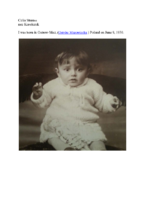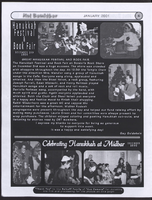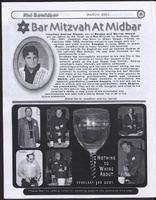Search the Special Collections and Archives Portal
Search Results
Tick Segerblom (Clark County Commisioner) oral history interview conducted by Magdalena Martinez and Taylor Cummnings: transcript
Date
Archival Collection
Description
From the Lincy Institute "Perspectives from the COVID-19 Pandemic" Oral History Project (MS-01178) -- Elected official interviews file.
Text

Biographical essay by Celia Strauss, 2014
Date
Archival Collection
Description
Celia Strauss describes her family history in Poland and fleeing the Nazis, narrowly escaping being captured or shot several times. She and her family came to the United States in 1947.
Text

Dr. Alvaro Vergara-Mery oral history interview: transcript
Date
Archival Collection
Description
Oral history interview with Dr. Alvaro Vergara-Mery conducted by Barbara Tabach on October 28, 2020 for the Latinx Voices of Southern Nevada Oral History Project. Alvaro discusses his personal history and his upbringing in both Chile and the United Kingdom before immigrating to the United States; due to political unrest in Chile, he moved to the U.K. where his mother was born before attending university in the United States. Alvaro talks about his work as a medical interpreter for University Medical Center (UMC) as well as his college teaching experience at University of Nevada Las Vegas and California State Berkley.
Text

Tanya Olson oral history interview: transcript
Date
Archival Collection
Description
Oral history interview with Tanya Olson conducted by Claytee D. White on July 6, 2018 for the Remembering 1 October Oral History Project. In this interview, Olson recalls beginning October 2, 2017 to photograph scenes surrounding the aftermath of the shooting at the Route 91 Country Music Festival. Her efforts culminated in a film that highlights the Healing Garden, a memorial established after the shooting. It was dedicated on the first Friday of October 2017. Her 6-minute film, Forever In Our Hearts, is described as "Citizens unite to provide kindness and salve the wounds caused by the October 1, 2017 massacre during a Las Vegas country concert." The film was shown at the Nevada Women's Film Festival in 2018. Olson discusses beginning her latest endeavor, matriculating at the American Film Institute, a lifelong dream that she is pursuing after 23 years in the military, a film degree from University of Nevada, Las Vegas (UNLV), and completing her film project on one of the worst massacres in American history.
Text
Kirsten Searer (Nevada Public Education Foundation) oral history interview conducted by Magdalena Martinez and Taylor Cummings: transcript
Date
Archival Collection
Description
From the Lincy Institute "Perspectives from the COVID-19 Pandemic" Oral History Project (MS-01178) -- Education sector interviews file.
Text

Della Coates interview, March 18, 1978: transcript
Date
Archival Collection
Description
On March 18, 1978, collector Bill Hitchcock interviewed Della Coates (b. June 17th, 1919 in Birmingham, Alabama) at her home in Las Vegas, Nevada. In the interview, Della Coates discusses her time working for the telephone company. She also speaks about the changes in education and about changes throughout Las Vegas.
Text

Transcript of interview with David Bruce Dill by Luise A. Soholt, March 13, 1975
Date
Archival Collection
Description
Text



